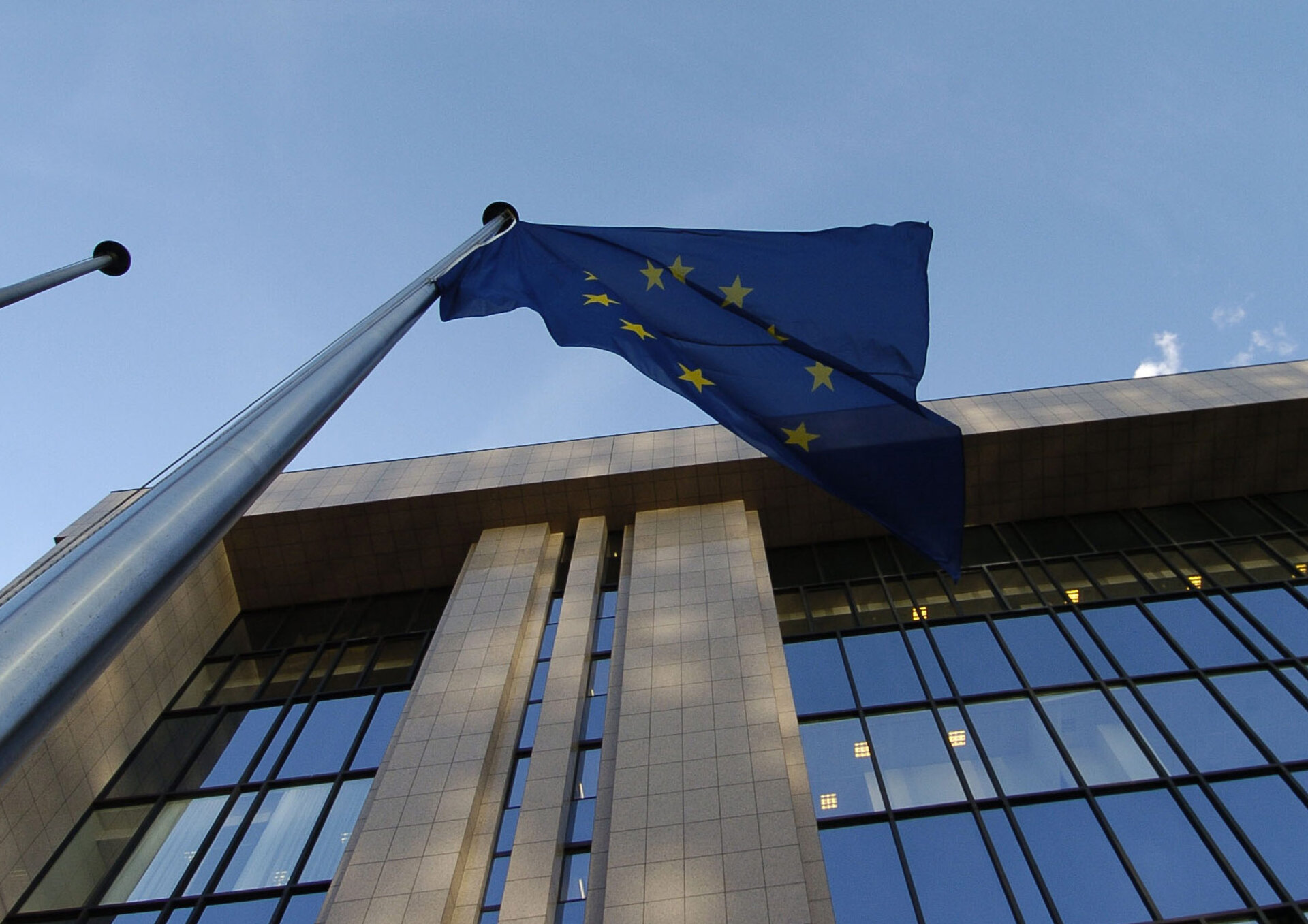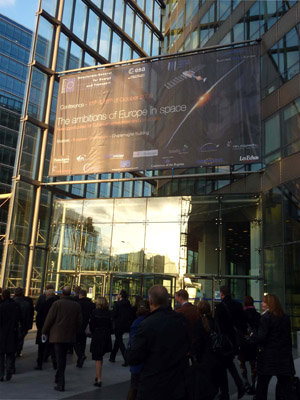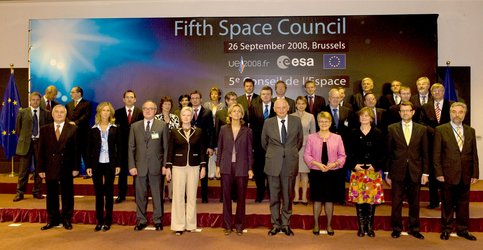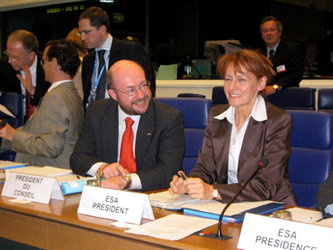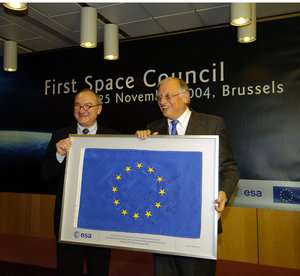Global Monitoring for Environment and Security is main issue for Third Space Council
ESA PR 55-2005. The third meeting of the Space Council – a joint and concomitant meeting of the ESA Council at ministerial level and of the European Union Competitiveness Council (Internal Market/ Industry/ Research) – was held in Brussels today, Monday 28 November.
At this third meeting, chaired jointly by Lord Sainsbury of Turville, UK Minister for Science and current Chair of the EU Competitiveness Council, and Secretary of State Georg Wilhelm Adamowitsch, representing the German Minister for Economy and Technology Michael Glos, current Chair of the ESA Council at Ministerial level, the Ministers stressed the strategic importance of the initiative for Global Monitoring for Environment and Security (GMES). The objective of GMES is to provide Europe with reliable, timely information on environmental and security issues, on a sustainable basis, in support of public policy-makers’ needs.
The Ministers emphasised the importance of maintaining an autonomous European Earth observation capacity to support political decision-making and the significance of the international dimension of GMES and its status as the main European contribution to the worldwide Global Earth Observation System of Systems (GEOSS).
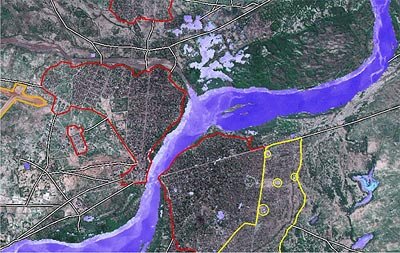
Implementation of GMES will see the early deployment of three fast-track services for Emergency Response, Land Monitoring, and Marine Services, due to enter the operational phase by 2008. Other services will follow according to a deployment plan covering the years 2009-2013.
GMES is an EU-led initiative. Its space component will be developed by ESA(*). ESA Member States will subscribe the ESA programme covering the development of the GMES space component at the ESA Council meeting at ministerial level next week. In parallel, the European Commission intends to allocate a major portion of the Seventh Framework Programme funding earmarked for space to GMES and, out of this allocated amount, to fund both GMES services and a significant proportion of the budget for the GMES Space Component until 2013.
In order to efficiently ensure the continuity of data needed to establish the GMES operational services and to avoid duplication, the Ministers requested that the best use be made of existing and planned satellite and in-situ systems at European and national level. To this end, they invited national Agencies and European organisations (such as Eumetsat) which already possess or are in the process of building up assets and capacities which could be valuable for GMES to make their capacities available to the GMES initiative under appropriate conditions. A group of experts has been set up to assess the most suitable structure for the longer-term governance and implementation of GMES.
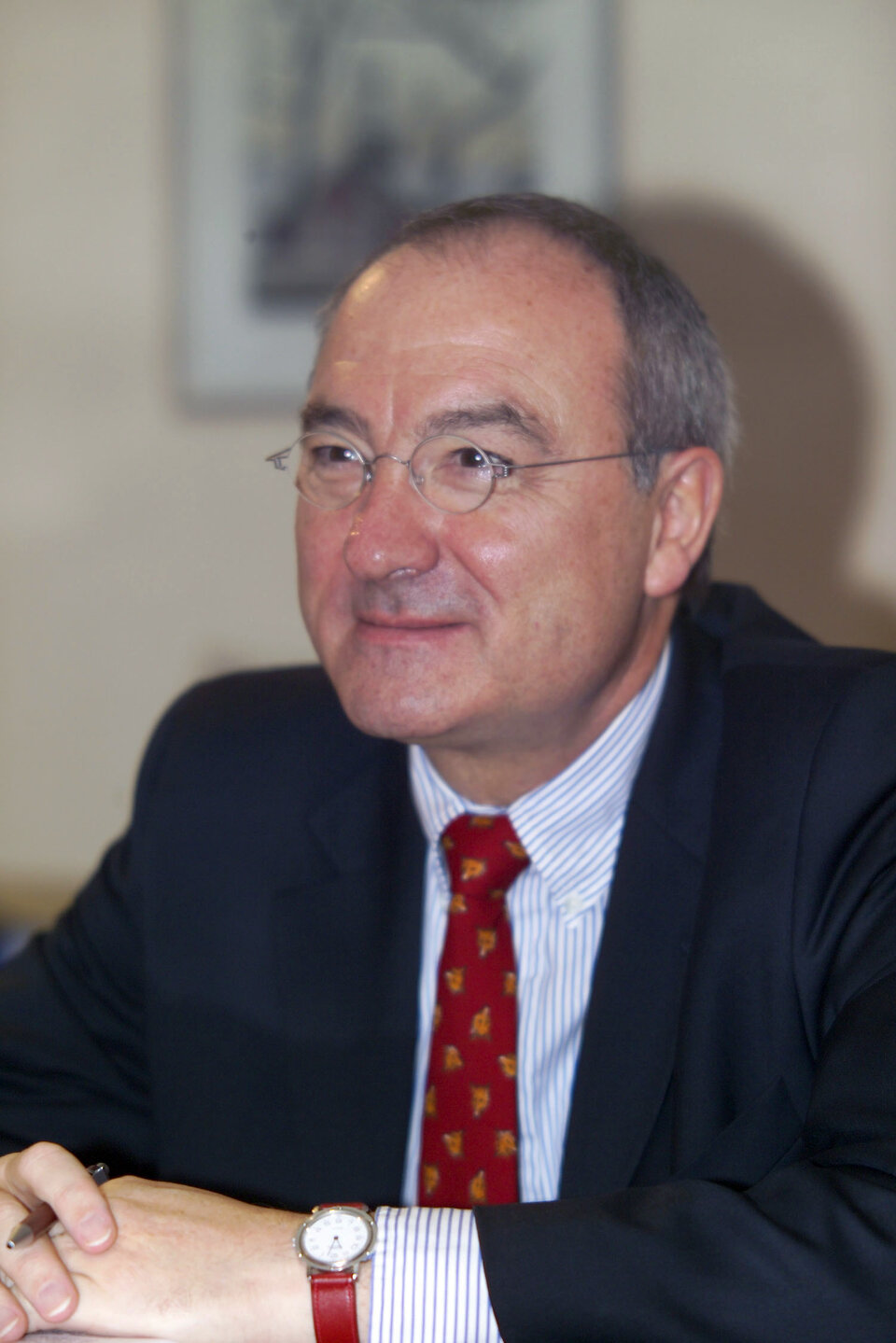
The third meeting of the Space Council was also attended by Mr Günter Verheugen, European Commission Vice-President, in charge of enterprise, industry, competitiveness and space matters, and Mr Jean-Jacques Dordain, Director General of the European Space Agency.
UK Minister Lord Sainsbury said: "Environmental monitoring is more important than ever before. GMES has the potential to bring together existing and new technology - helping us to better understand and protect our planet. Today Europe's space Ministers took a significant step towards achieving this."
The German State Secretary, Georg Wilhelm Adamowitsch, said: “With the Global Monitoring for Environment and Security Initiative (GMES), the second EU flagship programme after the satellite navigation system Galileo, Europe is building up a strategic global monitoring capacity. This will allow Europe to decide, on the basis of independent information, on issues such as the environment, sustainable development, natural resources and the security of its citizens. Germany will contribute to GMES not only via the EU and ESA, but also through national satellite missions and data processing structures.”
Commission Vice-President Günter Verheugen stated: I am very happy that at this meeting of the Space Council the directions the Commission proposed for the global monitoring system GMES were endorsed. GMES is the result of excellent cooperation between the Commission and ESA. This demonstrates our capacity to build an effective European Space Policy”.
ESA Director General Jean-Jacques Dordain said: "I am pleased that at this third meeting, the European Space Council confirmed GMES as the next European flagship for space. With the development of the GMES space component, ESA and European industry will once again put their expertise and capabilities to work to contribute to European and national agendas in environmental and security policy. In the framework of close cooperation between the Commission and ESA, Europe will soon have 'Sentinels in space' able to further improve the safety and well-being of all citizens in Europe and in the world."
(*) ESA’s proposal for the development of the space component of GMES is built around five concepts of space missions or “Sentinels”, plus access to complementary missions by ESA Member States, Eumetsat, Canada and third parties. Implementation will involve the rapid deployment of a first satellite (GMES-1) combining a C-band interferometric radar mission (Sentinel-1) with an ocean-land mission (Sentinel-3: altimeter, multispectral imager and sea surface temperature sensor); Sentinel-2 will be a multispectral optical imaging mission to implement the continuity of Landsat data. Sentinel-4 and Sentinel-5 will be two families of atmospheric chemistry monitoring missions, placed in geostationary and low-Earth orbit, respectively. The missions will be conducted according to a flexible architecture which may lead to the grouping of some missions, as with GMES-1.
Background
The Space Council was established to coordinate and facilitate cooperative activities between the European Community and ESA through their Framework Agreement, which was adopted in 2003 and entered into force in May 2004.
The first Space Council meeting took place in Brussels on 25 November 2004.
The second space Council was held in Luxembourg on 7 June 2005. The EC-ESA Framework Agreement has two main aims. The first is the coherent, gradual development of an overall European space policy, which will specifically seek to link demand for services and applications using space systems in support of EU policies with the supply through ESA of space systems and infrastructures necessary to meet that demand. ESA is acting de facto EU implementing agency.
The second aim of the Agreement is to establish a common basis and appropriate practical arrangements for efficient and mutually beneficial cooperation between ESA and the European Community, fully respecting the institutional and operational frameworks of each institution, to facilitate the setting up of joint initiatives and to provide a stable framework for EC-ESA cooperation to benefit all European citizens.
Over the last three years, the EU and ESA have worked together to outline a European space policy that identifies and prioritises objectives for space. The European space programme currently being put together will constitute a common platform for all the activities and measures to be undertaken by the EC, ESA and other stakeholders to achieve the objectives defined in the European space policy.
The European space programme will reflect the overall recommendations set out in the White Paper on Space, an action plan adopted by the European Commission in November 2003 for implementing an enlarged European space policy. Drafted in cooperation with ESA, the White Paper includes proposals for joint EC-ESA initiatives and takes the Framework Agreement as its basis for implementation.
For further information, please contact:
British National Space Centre Press Office
Tel.: +44(0)20.7215.0905
Gregor Kreuzhuber
Spokesman for Commission Vice-President Günter Verheugen Commissioner for Enterprise and Industry, in charge of competitiveness and space matters
Tel.: + 32 (0)2 296 65 65
Franco Bonacina
Spokesman for ESA Director General Jean-Jacques Dordain
Tel. : + 33 (0)1 53 69 71 55
See also: europa.eu.int/comm/space


